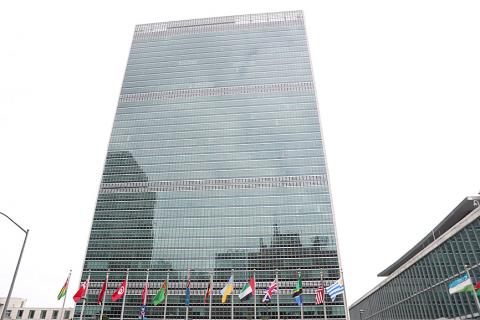Reporters Without Borders (RSF) yesterday called for Taiwanese reporters to be allowed to cover UN events, including the annual World Health Assembly (WHA).
“In recent years, the UN has been under pressure from China to turn down requests for press accreditation from Taiwanese nationals and media on the pretext that Taiwan and its passport are not recognized,” RSF said in a news release.
Taiwanese journalists were denied accreditation to cover the International Civil Aviation Organizati’s (ICAO) 2016 assembly and also to cover the WHA in 2017 and last year, it said.

Photo: Reuters
“The current ban contradicts the fundamental right to free information stated in Article 19 of the Universal Declaration of Human Rights,” the statement quoted RSF secretary-general Christophe Deloire as saying.
“Accrediting bona fide journalists and media is not a political move and should not depend on their nationality or the geographical origin of the outlet they represent,” he said.
Like other journalists and media around the globe, Taiwanese reporters are entitled to cover UN events, even if the UN sees Taiwan as part of China, it said.
The group listed a series of upcoming UN events that it said Taiwanese media should be granted access to, including the 72nd WHA from May 20 to May 28 in Geneva, Switzerland; the 74th annual General Assembly from Sept. 17 to Sept. 30 in New York City; and the 40th ICAO Assembly from Sept. 24 to Oct. 4 in Montreal, Canada.
Taiwan was ranked 42nd out of 180 in the RSF’s 2018 World Press Freedom Index, the highest in Asia.
China was ranked 176th in the index, with more than 65 journalists and citizen journalists imprisoned in the country.

LONG FLIGHT: The jets would be flown by US pilots, with Taiwanese copilots in the two-seat F-16D variant to help familiarize them with the aircraft, the source said The US is expected to fly 10 Lockheed Martin F-16C/D Block 70/72 jets to Taiwan over the coming months to fulfill a long-awaited order of 66 aircraft, a defense official said yesterday. Word that the first batch of the jets would be delivered soon was welcome news to Taiwan, which has become concerned about delays in the delivery of US arms amid rising military tensions with China. Speaking on condition of anonymity, the official said the initial tranche of the nation’s F-16s are rolling off assembly lines in the US and would be flown under their own power to Taiwan by way

OBJECTS AT SEA: Satellites with synthetic-aperture radar could aid in the detection of small Chinese boats attempting to illegally enter Taiwan, the space agency head said Taiwan aims to send the nation’s first low Earth orbit (LEO) satellite into space in 2027, while the first Formosat-8 and Formosat-9 spacecraft are to be launched in October and 2028 respectively, the National Science and Technology Council said yesterday. The council laid out its space development plan in a report reviewed by members of the legislature’s Education and Culture Committee. Six LEO satellites would be produced in the initial phase, with the first one, the B5G-1A, scheduled to be launched in 2027, the council said in the report. Regarding the second satellite, the B5G-1B, the government plans to work with private contractors

‘NARWHAL’: The indigenous submarine completed its harbor acceptance test recently and is now under heavy guard as it undergoes tests in open waters, a source said The Hai Kun (海鯤), the nation’s first indigenous defense submarine, yesterday began sea trials, sailing out of the Port of Kaohsiung, a military source said. Also known as the “Narwhal,” the vessel departed from CSBC Corp, Taiwan’s (台灣國際造船) shipyard at about 8am, where it had been docked. More than 10 technicians and military personnel were on deck, with several others standing atop the sail. After recently completing its harbor acceptance test, the vessel has started a series of sea-based trials, including tests of its propulsion and navigational systems, while partially surfaced, the source said. The Hai Kun underwent tests in the port from

MISSION: The Indo-Pacific region is ‘the priority theater,’ where the task of deterrence extends across the entire region, including Taiwan, the US Pacific Fleet commander said The US Navy’s “mission of deterrence” in the Indo-Pacific theater applies to Taiwan, Pacific Fleet Commander Admiral Stephen Koehler told the South China Sea Conference on Tuesday. The conference, organized by the Center for Strategic and International Studies (CSIS), is an international platform for senior officials and experts from countries with security interests in the region. “The Pacific Fleet’s mission is to deter aggression across the Western Pacific, together with our allies and partners, and to prevail in combat if necessary, Koehler said in the event’s keynote speech. “That mission of deterrence applies regionwide — including the South China Sea and Taiwan,” he